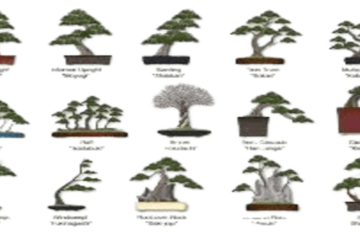Are bonsai trees poisonous to cats? There are many ways you can protect your cat from these toxic plants. Bonsai trees are really attractive and can make for a great decoration, but they are a no-no if you have a cat in the house!
Cats chew on anything they find, whether it’s a wire, a chair, a flower even a tree. Given the size of miniature trees such as bonsai trees, they are often prone to cat attacks. So if you are a cat parent, there’s no need to worry about a few leaves or branches that fall from your bonsai tree.
Most bonsai trees are toxic to cats. A cat may be shocked or even die after eating a bonsai tree. All bonsai trees are not toxic, but some basic precautions should be taken to protect your cat from the harmful effects of the plants.
You have to know which bonsai trees are poisonous for your cat and which are safe. This article covers some basic advice on how to enjoy your bonsai gardening hobby without worrying about your cat.
What are Bonsai trees?
Content Overview
Bonsai trees are miniature trees that are popular in Japan. They are often used as decoration in homes and offices. Various kinds of trees, including evergreens, maples, and birches, may be used to create bonsai trees.
All Bonsai trees are not poisonous to cats. However, the tree’s leaves and branches can pose a choking hazard if your cat tries to eat them. To protect your cat from harm, keep the bonsai tree out of reach or place it in a room that your cat does not have access to.
Why Are Bonsai Trees Poisonous to Cats?
Many plants are poisonous in order to keep your cats and dogs away. Cats and dogs may be poisoned by certain plants. Cats have a strong sense of smell. They have an extra organ called Jacobson’s organ inside their nose which helps them to smell better. As soon as they smell some sort of odor in their surrounding, they feel like eating it or playing with it in most cases.
Bonsai trees also have an in-built defense mechanism. The toxin called Hydrangein is harmful to cats and dogs as it affects their nervous system and stops them from breathing. This can be a deadly poison if eaten by them and immediate medical care may be required to save their life. Poisonous plants contain certain types of alkaloids that affect various organs such as the heart, lungs, and brain with the consumption of just one leaf.
In some cases, plants have in-built defense mechanisms to keep animals and insects away. It is a form of pesticide on its own. Cats, who have a strong sense of smell, become attracted to these kinds of things very easily. So they should be kept away from these kinds of trees to prevent them from getting harmed or even dying due to consumption of such poisonous plants.
Why should your Cat be protected from them?
Bonsai trees are beautiful and intriguing, but did you know that they can be poisonous to cats? The leaves and needles of bonsai trees contain toxins that can cause vomiting, diarrhea, and other serious health problems in cats. If you have a bonsai tree in your home, it’s important to take steps to protect your cat from it. Here are a few tips:
– Your cat should not be able to reach the bonsai tree. If possible, put it in a room that your cat doesn’t have access to.
– Don’t let your cat play with or chew on the leaves or needles of the bonsai tree.
– Regularly check the bonsai tree for damaged leaves or needles, and remove them promptly.
– If your cat is in the same room as the bonsai tree, keep an eye on it. If you notice any changes in behavior, such as vomiting or diarrhea, contact your veterinarian immediately.
The risk of bonsai trees and what they can do to a cat.
Bonsai trees are not poisonous to cats, but they can pose a risk to your feline friend. If a cat ingests the leaves or needles of a bonsai tree, it could experience gastrointestinal upset. Symptoms of gastrointestinal upset in cats include vomiting, diarrhea, and lack of appetite. In severe cases, a cat could also experience dehydration and weight loss. If you suspect that your cat has ingested a bonsai tree, it’s important to take them to the vet immediately.
There are some things you can do to protect your cat from bonsai trees. If you have a bonsai tree in your home, make sure it is out of reach of your cat. You can also consider placing the tree in a room that your cat does not have access to. If you have an outdoor bonsai tree, make sure it is surrounded by a fence or other barrier that your cat cannot get through.
Which bonsai trees are safe for cats?
It’s impossible to identify which bonsai tree is ideal for your cat. Every cat is unique and responds to situations differently, as you are aware. Some cats will keep nibbling on plants even if they don’t like going near them, and you can’t get them off.
The good news is that most types of bonsai trees are perfectly safe for cats to play around with and even eat from. You just need to make sure that your cat doesn’t have access to these kinds of trees There are a few different types of plants that can be used in bonsai gardens, but only some of them pose any danger to cats.
Therefore, not all bonsai trees are harmful to cats. If you own the following bonsai trees, you can be confident that your cat is healthy.
Juniper Bonsai Trees
Cats may safely eat juniper bonsai trees, which may be cultivated at home. But what about other types of bonsai trees? Are they also safe for cats? Which are those species which can be grown in a house? The answer to these questions will help you find a beautiful new tree to grow in your living space as well as keep your cat happy and healthy.
Now that you know which bonsai trees are safe for cats, it’s time to look at some of their wonderful benefits. Juniper bonsai trees are low maintenance, making them an excellent choice for beginner gardeners who don’t have a lot of time to spend working in their yard. They grow between 2 and 3 feet tall and wide, and they need minimal pruning to maintain their shape and size.
The Bamboo Palm
The bamboo palm (Chamaedorea Seifrii) is a beautiful tropical plant that is relatively easy to grow indoors. It’s best suited for interiors in subtropical and tropical regions because it isn’t particularly cold-hardy. Over time, the plant may grow large enough to be used as a small bonsai tree, but for now, it makes an excellent houseplant that can withstand average indoor temperatures.
For bonsai enthusiasts, it can be challenging to find safe plants for their feline friends. Most trees and shrubs are toxic to cats and dogs, making bamboo palms a popular choice for people with both indoor cats and bonsai trees.
Money tree
The money tree, also known as the Pachira aquatic is a tiny tropical tree with palm-like stalks and clusters of big, heart-shaped leaves. It grows in warm, wet woods and stream banks in its native range, which stretches from southern Mexico to northern South America. These trees are often found indoors as ornamental plants in Japan.
The heart-shaped leaves of the money tree are about 4 to 8 inches in size and can grow to a maximum of 16 inches. The flowers are small and yellow, with about six petals each. They are pollinated by insects and have both male and female reproductive organs. These trees grow very fast, sometimes reaching heights of 40 feet in just three years.
Their trunk is short but wide at its base. They can tolerate full sun but thrive when grown indoors in partial shade or filtered sunlight. And it’s low-maintenance to take care of, so there’s really no harm in doing it at that time. And to top it off, this doesn’t have any toxic compounds, so it won’t do any harm to your pet. However, if they can’t digest the plant, it may irritate their stomach a little but nothing more than that.
Aside from these trees, there are many other beautiful trees, like prayer-plants, hibiscus, Fukien Tea, and Japanese maple. These plants are safe for your cat and are completely harmless.
Which bonsai trees should you avoid for cats?
While most bonsai trees are harmless to your cat, there are a few that you’ll want to keep them away from. Unfortunately, many common varieties of bonsai trees belong in that category. If you have one of these trees in your home, it may be best to move it out of reach for now. Here are some common varieties that can be harmful.
Typical pine (or juniper) –
Typical pines contain oils and acids that are very toxic to cats; if ingested, they can cause severe gastrointestinal problems or even organ failure.
Japanese black pine is particularly dangerous due to its thin branches and long needles—both of which will break off easily when touched by curious paws.
Cherry blossom
The leaves of cherry blossom trees are poisonous to cats. Vomiting, diarrhea, and stomach discomfort may occur after just a little consumption.
Azaleas
Azaleas also produce toxins that can lead to vomiting and diarrhea in cats.
Boxwood
Boxwood contains oxalates that are poisonous to both humans and animals alike; ingestion of boxwood leaves can lead to nausea, vomiting, fever, lethargy, weakness, lack of appetite, and abdominal pain
Sago Palm Tree
Any pet owner should avoid this tree. Any animal, not just cats, should avoid this creature. It’s harmful to all animals. Cats are especially susceptible to the toxicity of leaves, roots, and stems. The seeds of this tree, in particular, are poisonous. The poison will begin to take effect within 15 minutes if your cat consumes any portion of this tree. As a result, having a cat makes growing bonsai trees extremely difficult.
Jade plant
For many bonsai tree enthusiasts, it’s a classic option. However, if you have a cat in your home, it should not be your decision. Every part of the plant contains poisonous elements. Your cat will immediately receive poisoning symptoms if it consumes even a tiny amount of this plant. This plant is so harmful to your cat that it can be deadly.
It would help prevent plum trees, cherry trees, fig trees, and other types of trees by taking these three major ones into account.
Symptoms of bonsai tree poisoning in a cat
When cats consume a bonsai tree, they may be poisoned. If you have a cat and bonsai trees, be aware of these symptoms of poisoning:
- Lethargy
- Weakness or loss of coordination,
- Vomiting and diarrhea.
- Agitation,
- Drooling and losing appetite
- Stomach ache/ Upset stomach
- Weakness
- Slow heart rate
- Lack of movement
- Seizure
- Coma
- Too much panting
Although cats rarely eat large amounts of bonsai tree needles, leaves, or roots on their own, it’s best to consult your veterinarian if you suspect your cat has been poisoned by one.
All parts of a bonsai tree, except for its fruit, contain needle-like calcium oxalate crystals. Cats may get poisoned if they chew on or eat these pieces.
Symptoms include agitation, vomiting, and diarrhea. If your cat appears lethargic or uncoordinated after chewing on your bonsai tree, take it to a veterinarian immediately. Poisoning can be fatal if it isn’t treated quickly and properly. Fortunately, most cases are mild and easily treatable.
When bonsai trees are cut, it releases a compound called pulegone. This chemical can cause severe stomach upset in cats, resulting in drooling, vomiting, and diarrhea. If you have a cat and bonsai trees, be aware of these symptoms of poisoning: lethargy, weakness or loss of coordination, vomiting, and diarrhea.
What Makes These Plants Dangerous to Cats?
There are a few plants that are especially toxic to cats. As many as 80% of these poisonous houseplants belong to either the lily family or an umbrella-shaped plant called Dieffenbachia (commonly known as Dif, Dumb Cane, or Elephant Ear). Plants in these two families contain what’s called calcium oxalate crystals, and when ingested by cats, cause swelling of tissues in their mouths and throat that makes it difficult for them to breathe.
We will focus on some plants that can be found in most homes or gardens. If you suspect your pet has consumed any of these potentially dangerous plants, take him to a vet immediately. The longer it takes for treatment, the worse your cat’s chances are of making a full recovery.
Treatments to try out for bonsai poisoning
It’s important to determine what part of your cat is actually affected. In other words, did he eat your bonsai or simply sleep under it? Even though there is no scientific evidence proving which treatment works best for a particular problem, below are some treatments to try out when dealing with bonsai poisoning.
Since there is no known cause for bonsai poisoning in cats, most treatments have been attempted on a case-by-case basis.First of all ,if you get any sing for poisoning cats you have first aid treatment. Then,Some remedies that could help are activated charcoal tablets; syrup of ipecac (which can induce vomiting); and petroleum distillate (which works as an emetic). Other foods contain methylxanthines, such as grapes, raisins, chocolate, coffee beans, and so on.
In case your cat ate your bonsai tree, you’ll have to induce vomiting. Take him to a vet immediately, as he may need further treatment depending on how much poison he has consumed.
Why Cats Shouldn’t Touch These Plants?
The leaves of many plants, including bonsai trees, are highly toxic to cats. In fact, certain plants have leaves or chemicals that can be harmful even if they are touched and then licked off by a cat. If your cat has been spending time around your house’s bonsai tree and you notice he’s suddenly become lethargic, unresponsive, or otherwise ill-looking, take him to a veterinarian immediately for a checkup.
There are many plants your cat should avoid. To help keep him safe, here’s a list of some of the more common toxic plants: bromeliads, gardenias, Callas, azaleas, rhododendrons, and lilies. If you want to be sure your bonsai tree is safe for kitty contact, check out The ASPCA’s website. It has an extensive list of toxic plants and their effects on pets.
How to protect your cat from bonsai trees.
Bonsai trees are beautiful, but they can be dangerous to cats. The trees can release toxins that can make your cat sick. To keep your cat safe, follow these guidelines:
-Your cat should be kept away from the bonsai tree. If possible, put it in a room that your cat cannot access.
-Monitor your cat closely if it does come into contact with the tree. Watch for symptoms such as vomiting or diarrhea. Take your cat to the veterinarian as soon as it becomes sick.
-Do not let your cat drink from the water bowl used for the bonsai tree. The water may contain toxins that can harm your cat.
By following these simple tips, you can help keep your cat safe from bonsai trees.
Keeping your cat away from bonsai trees
To keep your cat away from bonsai trees, it’s a good idea to purchase a non-toxic bonsai tree and hanging trees. Placing and hanging it near an open window. If you have other pets around your homes, such as dogs or small children, you may want to consider getting more than one decoy; cats are highly territorial and likely won’t be able to resist trying to take over more than one of these non-toxic trees.
It’s important that you take action as soon as possible because cats can cause a lot of damage in a short amount of time. If your cat bites or scratches a bonsai tree, you’ll need to stop him before he causes any long-term damage or kills your tree.
Preventing Tragedy
When it comes to your cat and bonsai trees, prevention is key. While eating a bonsai might not cause immediate harm, it can be toxic if consumed in large quantities over time. The most effective way to keep your cat safe around bonsai trees is by keeping them out of your home entirely. Many owners display their potted plants outside or in rooms that only humans frequent—not felines.
If you must keep your cat indoors with your bonsai trees, take steps to keep him safe. Declawing is a popular option for many owners. This removes any chance of your cat getting hurt by a falling branch and keeps them out of reach of potted plants that they might climb into. Place plants high on shelves or keep them in rooms where cats are rarely allowed—like laundry rooms or garages.
The Final Thoughts
In summary, depending on the species you choose, bonsai trees are and aren’t poisonous to cats. Some may be harmful to cats, while others may be harmless. Choosing a feline-friendly species is always the best option if you want to keep your cat and bonsai tree in the same location.
Read More:




